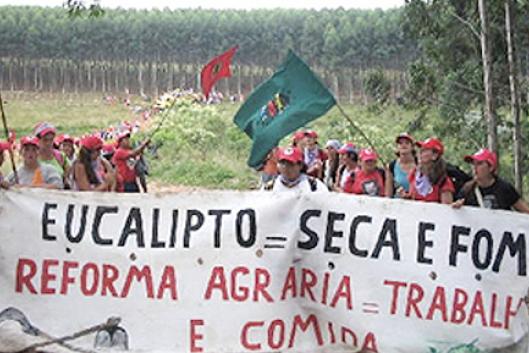As expected and despite the strong national and international opposition, on April 9, the Brazilian National Technical Commission on Biosafety (CTNBio) approved the commercial use of a genetically modified (GM) variety of eucalyptus. The request was made by the company FuturaGene, a subsidiary of the giant Suzano Pulp and Paper. CTNBio’s decision made Brazil the first country worldwide to approve a variety of GM eucalyptus, setting off alarm in the country and in the Latin American region.
The approval of the GM eucalyptus was originally scheduled for March 5. But the decision was postponed thanks to the actions of thousands of women and peasants. Women from different social movements in Brazil occupied the nursery in the State of Sao Paulo where the GM seedlings were grown and warned of their destructive and pernicious effects on biodiversity and rural communities. Simultaneously, in Brasilia, peasants accessed the CTNBio meeting venue with chants and placards rejecting the approval of several GM plan varieties, including GM eucalyptus. These actions were held on the Day of Women Farmer’s Struggle against the violence of agribusiness and its effects on women and peasants.
The GM variety which was finally approved, called H421, was created to increase yield by 20% in tree plantations. According to the company’s statement, issued on the day of the approval, “yield increase provided by the GM eucalyptus will provide economic, environmental and social benefits … The main environmental benefits derived from using less land to produce more fiber will include lowered carbon emission through the reduction of distance between the forest [sic!] and mills, reduced use of chemical inputs and greater availability of land for other purposes, such as conservation and food production”. Stanley Hirsch, Executive Director of FuturaGene said “Producing more wood without increasing the use of natural resources is a constant challenge for all industry players. We are proud to have developed an innovative technology that is capable of potentiating forestry industry competitiveness while benefiting society as a whole” (1)
However, the benefits FuturaGene expects are intended for the interest of its owner’s pockets: the Brazilian giant Suzano Celulosa & Paper, owner of almost 900,000 hectares of land within Brazil (see WRM’s website for more information about the Suzano company).
There are no grounds for the argument of “using less land to produce more fiber” if one looks at plantation industry history. First, the plantation industry has always encouraged excessive and unnecessary paper consumption, which has resulted in the current excessive consumption by a minority concentrated in the North (See the WRM video on paper consumption). Besides, while the industry has managed to increase tree plantation production, it has also invaded large tracts of new land. In Brazil, in the 1980s, when production was 27m3 per hectare per year, plantations occupied an area of about 4 million hectares. Currently, production is around 44m3 per hectare per year, and about 7.2 million hectares of land are occupied. It is estimated that by 2020, if companies receive the necessary incentives from the Brazilian States, the area will be extended to 14 million hectares. (2)
There are no signs that the plantation industry is thinking of occupying less land to make room for food production. On the contrary, the planned expansion will increase existing land conflicts and food sovereignty issues in Brazil.
It is scarcely credible that yield can increase without intensifying the already known negative impacts of monoculture plantations on biodiversity, soil, water, etc. Brazilian and international organizations have denounced that the GM eucalyptus will consume far more water. This new tree is expected to achieve its required growth in four years, instead of seven years. But it is during its first years that a tree consumes more water to grow; therefore, the genetic modification to speed up the growing process will cause severe impacts to watersheds and nearby communities due to the loss of water. There will also be the water and soil pollution caused by the use of pesticides and negative effects on local food sovereignty (see more information in WRM Bulletin of March 2015).
Another complaint submitted to the CTNBio by peasants and social movements in Brazil is linked to the socioeconomic impacts of the GM eucalyptus because of its connection with honey production. Brazil is the second-largest global producer of organic honey and it is estimated that about 350,000 families depend on this activity (3). Eucalyptus is the main source of pollen for bees in Brazil. The new GM variety of pollen can be detected in honey, which will close the doors to Brazilian honey in several international markets - in addition to its unknown health impacts.
The Global Campaign against Agrotoxics criticized Brazil’s decision, yet another in a list of recent steps backwards. While many countries are discussing measures to reduce transgenic and pesticide use, Brazil has decided to approve a GM eucalyptus variety and ignore the precautionary principle of the Convention on Biological Diversity, by turning a blind eye to the lack of information on environmental and social risks that transgenic organisms will bring to the population as a whole.
However, given such a bleak scenario, social movements, Brazilian and international organizations have waged an exemplary struggle. The brave actions undertaken by social movements in Brazil, along with the thousands of organizations and individuals who sent letters calling on CTNBio to refuse the approval, were a wake-up call in Brazil and elsewhere. The reaction alerted organizations and movements to this new threat. Forest companies like Fibria, Suzano, Stora Enso, International Paper, all occupying vast areas of land with tree plantations, are conducting experiments with GM trees worldwide (4). We must remain alert and prevent other countries from following Brazil’s example.
- http://www.futuragene.com/
FuturaGene-eucalyptus- approved-for-commercial-use. pdf - http://wrm.org.uy/es/todas-
las-campanas/carta-abierta-a- la-comision-tecnica-nacional- sobre-bioseguridad-de-brasil/ - http://www.mst.org.br/2014/12/
09/a-quem-interessa-o-brasil- ser-o-primeiro-pais-a-liberar- eucalipto-transgenico.html - http://wrm.org.uy/es/libros-e-
informes/ge-tree-research-a- country-by-country-overview/
